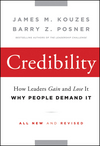Credibility: How Leaders Gain and Lose It, Why People Demand It
 Credibility: How Leaders Gain and Lose It, Why People Demand It, 2nd EditionISBN: 978-0-470-65171-1
Hardcover
272 pages
August 2011, Jossey-Bass
|
|||||||
A Q/A with the Authors of CREDIBILITY
Q.What's one thing you'd like people who read this book to do differently?
A. At the end of every day, ask yourself three questions:
- What did I do today that clearly demonstrated that I was true to my values and beliefs and kept my commitments?
- What did I do today that, even inadvertently, was inconsistent with what I stand for?
- What will I do tomorrow to make sure that I am a role model for others?
Everyone needs to take the time to reflect every day on how they’re leading their lives, and if they’re acting in ways that are consistent with what it means to be credible. When this happens, our homes, neighborhoods, cities and corporations will be better places to live and work, and we’d all make better and more ethical decisions.
Q. Why was it so important that this book be written from the "constituents’ perspective?"
A. Way too many books are written about leaders and for leaders, and they seem to forget that it’s not all about the leader! After all, no one gets anything extraordinary all done by him or herself – the truth is that you can’t do it alone and so “would-be” leaders have to understand that what makes anyone a leader is that they have followers (we prefer the term constituents). This means that fundamentally leadership is about a relationship between leaders and their constituents. We’ve studied what people look for in those individuals they would willingly follow, and then provide a template for leaders about what they must be and do in order to gain the necessary trust for others to be keen to commit, and sometimes even sacrifice, in order to do what has been requested of them.
Q. We know, all-too-well, the headline grabbing ways leaders lose credibility (e.g. lying, stealing, and cheating) but are there common, everyday ways that we lose credibility in our busy, daily lives?
A. Ask people what credibility means behaviorally and they’ll give you some variation of “doing what you say you will do” (“walking the talk,” “putting your money where you mouth is”). Each day, individuals have numerous “moments of truth” where they get to demonstrate that they keep their promises. Some of the simplest violations are breaking the “golden rule” that says “treat others as you say you would like to be treated.” You don’t remain credible in other people’s eyes for very long when you are inconsiderate, thoughtless, insensitive, rude, mean, and the like. Here’s the rub: Other people always take what you say as a promise, even if you didn’t necessarily mean it as a commitment, so you better be careful (and thoughtful) about what you say. Moreover, we don’t find people very credible when they are always making excuses, and blaming others or situations, for why they didn’t deliver. Finally, people who only care about their own interests and have the attitude that everyone else can be “damned” do not generally generate the admiration of other people and are seldom willingly followed.
Q. In the same way that people sometimes mistaken kindness for weakness, is it at all possible that credibility is confused with ineffectiveness?
A. The truth is that credibility is the foundation of leadership, and it really is at the center of every effective relationship (interpersonal and organizational). If people don’t trust you, if people don’t feel you know what you are talking about, if people believe that your lost, and if people sense that you don’t really care, than they are likely to reciprocate by not caring or working very hard and being suspicious of your motives.
Q. You've been researching and writing about the relationship between leaders and constituents for more than two decades, does power corrupt?
A. No. Contrary to the oft-quoted opinion of the late Lord Acton, power does not corrupt. Now, do some people abuse the power they have? Absolutely. Look, power is simply the capacity to direct or influence the actions of others to get things done. Every leader needs some source of power to make things happen. You need the power that comes from your competence, from your personal energy, and from the strength of your values to mobilize people to want to struggle for shared aspirations. You can’t fuel movements without power. But, you can use the power you have for good or evil. You can use it to save lives or destroy lives. You can use it to build people up, or you can use it to tear them down. You can use power to unite or you can use it to divide. That’s why it’s vital to focus on the character and integrity of leaders and that organizations and societies select, develop, and promote leaders who take seriously the notion that the essence of their work is to make other people feel more capable, and not less capable, as a result of what they do.
Q. Is there such thing as an arrogant, credible leader?
A. Not for long! While confidence in your competence is essential to being credible — after all, no one’s going to follow you if they think you don’t know what you’re doing — arrogance and hubris are credibility killers. “Know-it-alls” communicate that they are concerned more about themselves than they are about others, and human beings just don’t trust people who have only their own interests at heart. You have to show you appreciate others and that you see your job as serving others if you want to sustain credibility over the long term.






